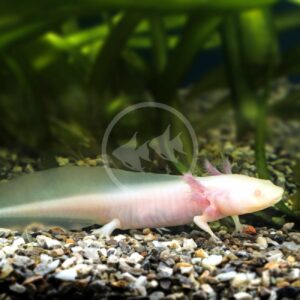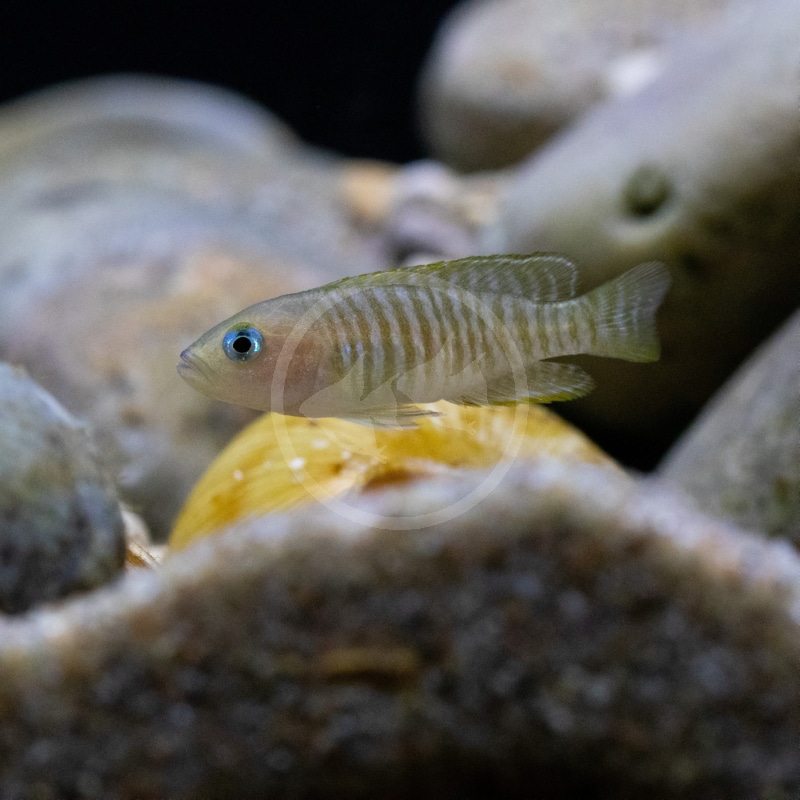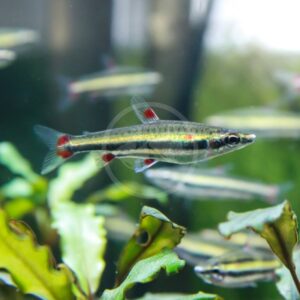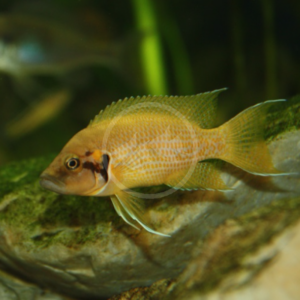CICHLID – SHELL DWELLER MULTIFASCIATUS
Neolamprologus multifasciatus
$9.99 – $16.99
Multifasciatus Shell Dwellers, also referred to as Multis for short, are endemic to the deep and open sandy coastal waters of Lake Tanganyika in Africa. A popular fish for beginner and seasoned cichlid hobbyists alike, Multifasciatus shell dwellers are not overly aggressive and are relatively easy to keep. Additionally, this species exhibits some really cool behavior! As their name suggests, Multifasciatus shell dwellers are shell brooders, meaning that they utilize empty snail shells as spawning and rearing sites. Territories for this species are extremely small, as it usually only includes a specific shell in which they have claimed. Females will bury a shell, except for the opening, and try to catch the attention of a male. Once she has, she will enter the shell to deposit her eggs and he will either join inside the shell if its large enough, or as she exits the shell, the male will release his sperm at the opening of the shell which will get pulled up into the shell by the act of the female exiting. After this, the male is no longer welcome near the shell and the female will sit on the shell’s opening fanning the eggs with her fins for the next 24 hours until the eggs hatch. These larvae do not become free-swimming fry until about 7 days post hatch. Multifasciatus shell dwellers thrive best in an active community aquarium or a cichlid aquarium with like-species; avoid large or aggressive species. Multifasciatus shell dwellers have tan bodies with many thin brown vertical stripes that stop behind the gill plate. Males can develop an orange-yellow tinge to their dorsal fin as they mature. Otherwise, sexing small or juvenile Multifasciatus shell dwellers can be difficult. Multifasciatus shell dwellers are best kept in a group of several females with a single male, called a colony, or a single male-female pair. The number of shells provided in a Multifasciatus shell dweller aquarium should well exceed the number of individuals. An adult male Multifasciatus shell dweller will grow to approximately 2″, while females will grow to 1-1/2″. Note: Many of our Multifasciatus shell dwellers are raised locally by hobbyists here in Wisconsin!
Care Level: Easy
Temperament: Semi-Aggressive
Live Plant Safe: With Caution
General Description: Multifasciatus Shell Dwellers, also referred to as Multis for short, are endemic to the deep and open sandy coastal waters of Lake Tanganyika in Africa. A popular fish for beginner and seasoned cichlid hobbyists alike, Multifasciatus shell dwellers are not overly aggressive and are relatively easy to keep. Additionally, this species exhibits some really cool behavior! As their name suggests, Multifasciatus shell dwellers are shell brooders, meaning that they utilize empty snail shells as spawning and rearing sites. Territories for this species are extremely small, as it usually only includes a specific shell in which they have claimed. Females will bury a shell, except for the opening, and try to catch the attention of a male. Once she has, she will enter the shell to deposit her eggs and he will either join inside the shell if its large enough, or as she exits the shell, the male will release his sperm at the opening of the shell which will get pulled up into the shell by the act of the female exiting. After this, the male is no longer welcome near the shell and the female will sit on the shell’s opening fanning the eggs with her fins for the next 24 hours until the eggs hatch. These larvae do not become free-swimming fry until about 7 days post hatch. A substrate-dwelling species, Multifasciatus shell dwellers thrive best in an active community aquarium or a cichlid aquarium with like-species that exploit other areas of the aquarium; avoid large or aggressive species. Multifasciatus shell dwellers have tan bodies with many thin brown vertical stripes that stop behind the gill plate. Males can develop an orange-yellow tinge to their dorsal fin as they mature. Otherwise, sexing small or juvenile Multifasciatus shell dwellers can be difficult. Multifasciatus shell dwellers are best kept in a group of several females with a single male, called a colony, or a single male-female pair. The number of shells provided in a Multifasciatus shell dweller aquarium should well exceed the number of individuals. An adult male Multifasciatus shell dweller will grow to approximately 2″, while females will grow to 1-1/2″. Note: Many of our Multifasciatus shell dwellers are raised locally by hobbyists here in Wisconsin!
Diet Requirements: A diet made up of various high quality protein based foods are ideal. Such options include frozen brine shrimp, calanus, daphnia and blood worms, and foods containing Spirulina algae are a plus. Multifasciatus shell dwellers will accept sinking pellet foods and flake foods as a staple, but these should not make up the majority of their diet. Variety is the spice of life in order to maintain color, immune function and longevity of your fish.
Care Requirements: An established minimum 20 gallon aquarium is ideal for a small group of Multifasciatus shell dwellers. Realistically with other tank mates, the minimum size tank would be that of 40 gallons or larger. Biweekly water changes are encouraged to keep water parameters ideal (Nitrates < 30 ppm). The aquarium should have a finer substrate that is at least 2″ deep and empty shells are absolutely needed for this species because shells are used as home refuges, not only as spawning sites. African cichlid specific substrates, or even a fine marine Aragonite substrate, are great choices because they will buffer the pH and alkalinity to levels characteristic of Lake Tanganyika that is needed for this species to thrive and spawn, if desired. Common tank mates for Multifasciatus include Altolamprologus, Julidochromis, Neolamprologus, and other dwarf African cichlids from Malawi [note potential different water chemistry preferences, however; namely pH]. Compatability with other shell dweller species is variable but usually discouraged. Stacks of rocks may be required for some tank mates to set-up their own territories away from Multifasciatus shell dwellers. While Multis will not bother live plants, there are few that will thrive in the water parameters desired by this fish. Recommended water conditions, 72-82° F, KH 8-25, pH 7.5-9.0.
Purchase Size: Small: 3/4” or less; Medium: 1” to 1-1/4”
Note: Your item may not look identical to the image provided due to variation within species. Purchase sizes are approximate.
Dry goods orders are shipped via US Postal Service or UPS to the address provided at checkout based on the selection made in your website shopping cart. Product is carefully packed to help prevent any damage during shipping. Once processed you will receive a shipment notification via email with tracking number, and delivery notification. Please allow 48 hours for processing after your order is placed.
Perishable items (i.e. live plants, refrigerated/frozen foods) are shipped via US Postal Service 2-3 day to the address provided at checkout for a $25.00 flat rate charge. Items are packed with secure packing material and heat, cold, or Cryo packs as needed to maintain safe temperatures during transit. If one or more perishable items are in the shopping cart at checkout the $25.00 perishable shipping charge will automatically appear and need to be selected. Once processed you will receive a shipment notification via email with tracking number. Please allow 48 hours for processing after your order is placed.
Livestock (i.e. fish, invertebrates, coral) are shipped via UPS Overnight to the address provided at checkout for a $55.00 flat rate charge. Livestock is packed in insulated styrofoam boxes with secure packing material and heat, cold, or Cryo packs as needed to maintain safe temperatures during transit. If one or more livestock items are in the shopping cart at checkout the $55.00 livestock shipping charge will automatically appear and need to be selected. Livestock is shipped Monday through Wednesday ONLY (no weekend delivery is available) weather permitting, and we reserve the right to delay shipping until conditions are appropriate for safe arrival. Once your order is placed we will contact you to arrange the best shipping date based on these criteria. Someone must be available to receive the livestock order on the first delivery attempt. Once processed you will receive a shipment notification via email with tracking number. Please allow 48 hours for processing after your order is placed.
For mixed dry goods/perishable & livestock orders items will be shipped via their corresponding shipping methods outlined above. Dry goods will be shipped via US Postal Service or UPS based on your selection and checkout, while livestock will ship via UPS Overnight for a $55.00 flat rate charge. You will receive separate notifications and tracking numbers for the dry goods and livestock. Please note due to different carriers and shipping methods dry goods and livestock may arrive on different days.
Related products
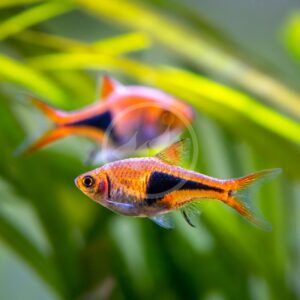
RASBORA – HET / HARLEQUIN
Trigonostigma heteromorpha
$5.99 – $8.99
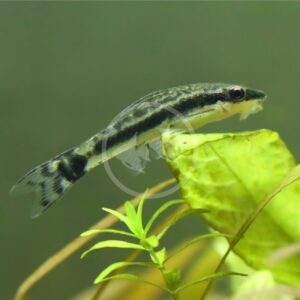
CATFISH – OTOCINCLUS
Otocinclus vittatus
$6.99
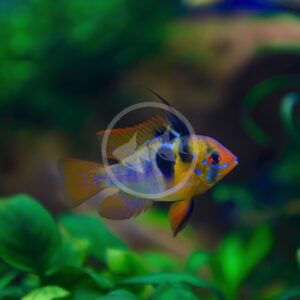
CICHLID – RAM GERMAN BLUE
Mikrogeophagus ramirezi
$12.99 – $24.99
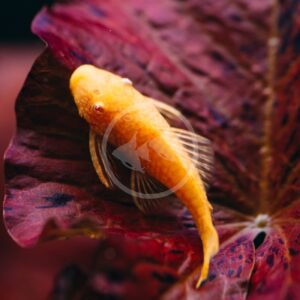
PLECOSTOMUS – BRISTLENOSE ALBINO / GOLD
Ancistrus sp.
$4.79 – $47.99
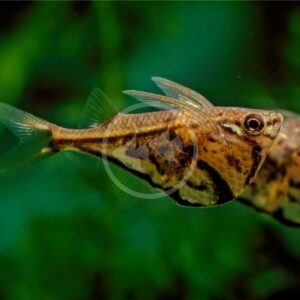
TETRA – HATCHETFISH MARBLE
Carnegiella strigata
$9.99
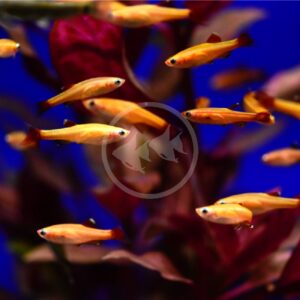
MINNOW – WHITE CLOUD MOUNTAIN GOLD
Tanichthys albonubes
$5.99
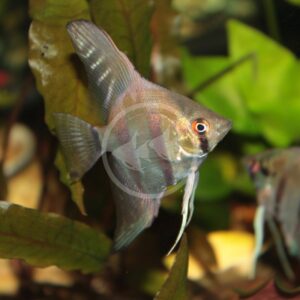
ANGELFISH – FW SILVER
Pterophyllum scalare
$9.99 – $39.99
